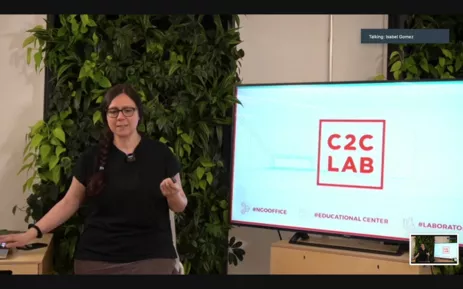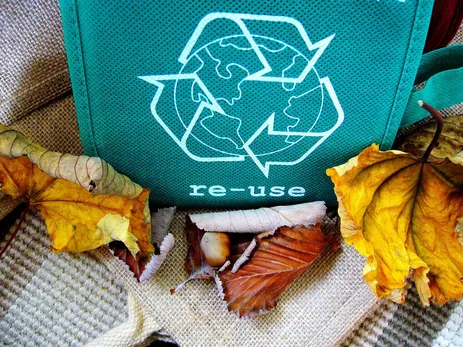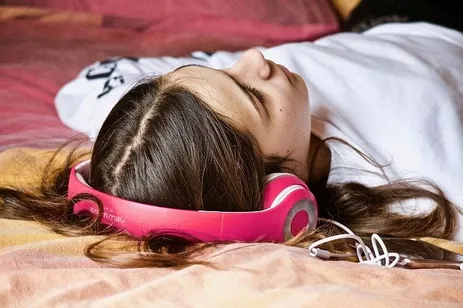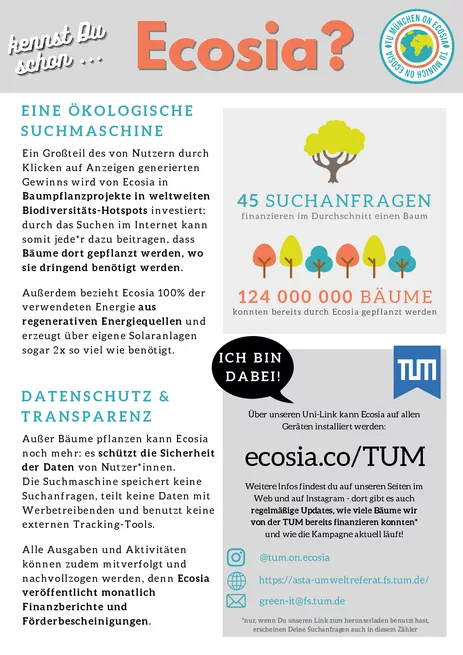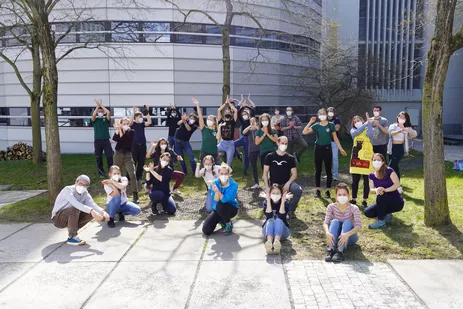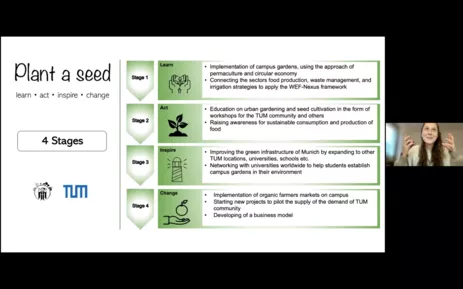Yesterday Stefan Ramesohl, Yasmin Djabarian and Tobias Michl closed our lecture series on sustainable digitalization or digital sustainability for now.
“We need a system thinking approach. This means understanding the interdisciplinarity and interdependence of systems and tackling its problems with criticism and self-reflection. Digitalization is useless if not steered in the direction of sustainability. We always have to ask ourselves: What do we need this for?” (Stefan Ramesohl)
“We want to make education better - which does not mean digital, but to use the advantages of digitalization. Digital tools help us to connect like minded as well as people from different disciplines. We could use all the brain power and innovation potential of the students to do the transition. But therefore we need structures that also allow to use it.” (Yasmin Djabarian)
“There is also the need for incentives and not only regulation. In the end digitainability is a political task. By laws and funding the direction of the work is set. Research is always going the way the money flows…”
(Tobias Michl)
Let’s become the translators between engineers and social scientists, politics, businesses and civil society! See you next semester with new old topics. We’re so excited to get things going!
Yesterday Monika Egerer and Ferdinand Ludwig presented their work on urban ecosystems and biomorph architecture. Living architecture like root bridges and greened office buildings or agro-ecosystems like rooftop farms are no futuristic vision anymore.
“Our city designs are still much about separation and not about synergies, this is completely outdated.”, as Ferdinand Ludwig explains. In the era of industrialisation and standardised materials the estrangement of humans, animals, materials and plants seemed forward-thinking. "Now we are working on reserving areas for insects, small mammals, flowers, crops and humans mutually.”, Monika Egerer concludes. These multifunctional interconnected ecosystems are not only serving us with food, cooling, recreation and giving space to animals but also strengthen our social grounding with the surroundings we live in and our fellow human beings.
Greening the city pays back! We shouldn’t wait.


On Monday, Andreas Wanke gave us a comprehensive overview about what has already been achieved since 2001 and what next steps will be taken.
For instance, FU Berlin currently saves 29% of the energy consumption which means 5.0 mill. € in comparison to 2001. "Money is a language everybody understands. The biggest difference between FU Berlin and TU München is the budget.” TUM has the financial and human capacities as well as the expertise to reach out for a similar goal.
Andreas Wanke also stressed that sustainability management is a cross-sectional task which requires multi-stakeholder processes. “You create a lot of work for a lot of people, so there has to be someone in the upper management of the university supporting the movement.” Let’s commit to climate neutrality!
Further information such as the sustainability reports from FU Berlin can be found here.
It's not about technology only!
Yesterday Thomas Auer, Professor for Building Technology and Climate Responsive Design at the TUM delivered a phenomenal presentation. We are inspired!
"There are expert circles who say that the building industry is going to have its Volkswagen moment soon!” A moment, when society realizes the performance gaps and demands stakeholders to do better. “We can never do better if we tear down an existing construction.” Astonishingly the low hanging fruits in cutting down carbon emissions of buildings lie in adopting a culture of sustainability! "Every decision has to be based on the value of sustainability - top down and bottom up.“
Can TUM get beyond lighthouse projects and be the role model for climate just construction? Our project groups are already working on it!


On Monday, Claudia Peus and Eva Sandmann gave us information about their work on gender justice, diversity and participation at universities - and beyond.
"Luckily it is not only women pushing women. People who have experienced diversity don’t tend to expect a person in a leadership position to be a white elder man”, as Claudia Peus reassures. Still, university structures tend to benefit this specific group with agentic characteristics. Therefore, TUM works on promoting more communal values through important initiatives at the Gender Equality Office or the TUM Institute for Life Long Learning.
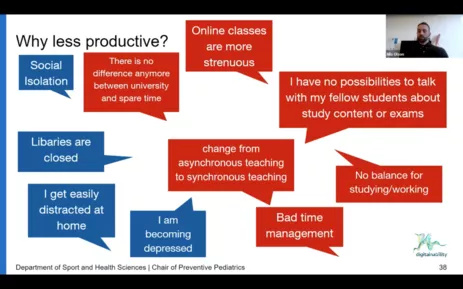
After the Pentecost break Nils Olson from TUM4Health and Maren Orre from TUM4Mind opened our section on social digitainability and universities with a very important topic:
How digital semesters influence the student’s study-(work)-life-balance - implications form the Corona Crisis
Before the pandemic, during the first and during the second lockdown TUM4Health gathered data about the TUM students’ study-work-life-balance and gained alarming insights: Whereas students enjoyed more flexibility (especially through asynchronous teaching), felt encouraged to develop healthier behaviour and gained more free time during the first lockdown, students’ feeling of loneliness and lack of social interactions, difficulties in time management and perception of stress increased. Students ranged their well-being according to the WHO-5 Index as 50 percent points lower during the second lockdown than before the pandemic. "We would have never thought that online university could find its way into normality so quickly!” And it is definitely not ok, that students seem to be one of the greatest losers of the pandemic. We need a sincere discussion about alternative solutions in the coming winter term.
Always feel free to reach out for help from TUM4Mind or TUM4Health !
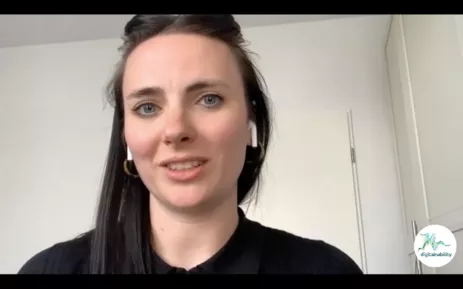
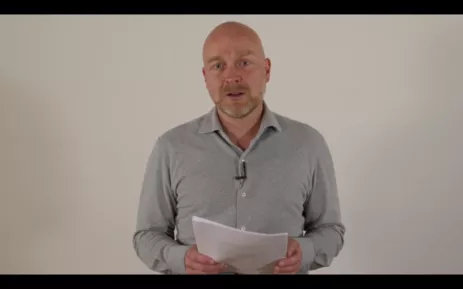
This was a fantastic closure of our section on the economic dimension of digitainability! As Marie Blachetta and Jens-Rainer Jänig from Initiative D21 pointed out we are in a phase of ongoing discussion about “what we want, but also what we do not want when it comes to the digital transformation”.
Digital responsibility plays a key role in these debates, for corporation but also the state or each one of us. Also, universities carry great potential for transparent data governance. But "there is no university yet involved in Corporate Digital Responsibility." Can universities like the TUM serve as important role models here?
See you again after the Pentecost break, then with a new section on the social dimension of digitainability!
Thank you very much for your inspiring presentation and workshop! Isabel Gomez from the NGO Cradle to Cradle was with us on Monday. She brought tons of info for us on how products, businesses & universities could implement ideas of circularity. "Cradle to cradle is a low hanging fruit. It just makes 100% sense! But there has to be a systemic, holistic mindset."
A Blog entry from our project seminar Digital Sustainability Transformation of, by and for the TUM
from Elisabeth Paul
Circular Economy and the University
Sustainability. Not just since yesterday, scientific evidence strongly suggests that the way humans live and operate in this world endangers the continued existence of the ecosystem Earth. Key developments such as the warming of the climate, the scarcity of finite resources and all other harmful effects of human, post-industrial activities on its environment are not empty doomsaying ideas, but serious developments that require a rethinking in society, politics and the economy.
But how can the maxim sustainability be translated into daily actions? This blog post will introduce a concept that has sustainable coexistence always in the goal, without losing sight of the big picture: a circular economy. What this concept means, how an application of a circular economy can look like, and which role universities, like the Technical University of Munich, can play in shaping it, will be the content of this post.
"Take, Make and Waste" is what humanity's current production and consumption patterns are based on, but there is increasing evidence that this linear thinking is pushing planet Earth to its planetary boundaries.1 To address the profound changes needed, and to drive transformation in business and society, the concept of the Circular Economy can provide a holistic approach. At the heart of the circular economy is the demand that economic growth should be decoupled from resource consumption. "Waste" does not exist anymore in this way; instead, resources are recycled and reused. In contrast to conventional recycling, resources at the end of their first use are seen as qualitatively equivalent raw materials for further use. In essence, two cycles of equal value can be identified side by side. A biological cycle, which leads renewable goods in a circle, and a technical cycle, in which commodities and their life cycle are considered.2
What is the role of a university in a circular economy, when it is primarily products and services that need to be rethought and redesigned for a circular economy? To answer this question in a nutshell: an essential one. A circular economy is not just about individual changes to some products here and there, but requires holistic, interdisciplinary thinking. The transformation from "cradle to grave" to a closed loop economy affects many cross-cutting issues, involving a wide variety of research areas. It requires new business models, new product designs, a new circular understanding of raw materials by companies and customers, new ways of production and consumption. All these changes can be initiated from within a university, which is why the Technische Universität München can use the concept of a circular economy to train the necessary different competencies through its teaching function, develop them through its research activities and shape the public perception and discourse with scientific evidence.
TUM has already taken the first steps in this regard, and a cluster such as "CirculaTUM" can help to bundle knowledge at the university and apply it in a targeted manner. The chair Circular Economy of Prof. Fröhling is also an essential step to pass on the circular idea to students at all schools/faculties. The idea of sustainable change by interdisciplinary cooperation and collaboration between students is already inherent in the self-image of TUM, because the mission of TUM states that competences of the different disciplines such as engineering and natural sciences and economics, humanities, social sciences should be bundled in order to be able to bring sustainable research and knowledge transfer into cooperation, teaching and also companies.3 The circular economy can be such a project, in which the cooperation of the disciplines is necessary, and the future interdisciplinary cooperation could already be demonstrated by universities. The challenges may vary in size and scope, but the urgency to find new methods of production and consumption is always very high.
As outlined by the Circular Economy Initiative of Germany, with the participation of experts from TUM, in the recently published Circular Economy Roadmap for Germany, science plays an important role in the implementation of a circular economy.4 The responsibility for implementing a circular economy cannot be placed solely on the economy or politics but requires a strong scientific basis on which to make well-founded decisions and implement the necessary research. In concrete terms, this should mean for universities to prioritize the concept of the circular economy in research and teaching, and also in the area of campus management.5
If the shift toward a circular economy is to succeed, there needs to be strong integration of the concept in every regard:
- In research, at new chairs and in trans- and interdisciplinary alliances,
- In teaching, through integration into the curricula of students in all disciplines,
- In everyday university life, through the promotion of student initiatives, the announcement of competitions with funding or real laboratories for circular projects,
- In campus management, through transparent communication about new projects, existing projects, and current status quo, and by using certified cradle-to-cradle products at the university as a role model.
A circular economy offers a great opportunity for science, business and politics to rethink processes in a new and sustainable way, and in doing so to start into a future that is equally still livable for the following generations. For universities, especially TUM, it is a chance to demonstrate how modern societies could research, teach and work in the future, creating new projects through interdisciplinarity and diversity for a sustainable world with a circular economy.
A Podcast of our project seminar Digital Sustainability Transformation of, by and for the TUM
by Darragh Power
With ComConsCafé: Conversations about the Commons over Coffee
Featuring: Grassroots acdvist, Tomás Lynch, from Dublin
Short: It's May 9th, Mothers' Europe Day, and our first ever ComCons Café! Today we introduce the broad topic of sustainability through the lens of progressive strategies for change. We talk aboutthe role of Europe on the global stage, whose specter condnues to haunt our conversation, and about sites of revolutionary struggle from Haiti to Hong Kong and the Black Atlantic. Who are the agents of progressive change? What means must they employ to achieve their desired aims? How can we foster a sustainable international coalition? So join us in thinking about Democracy, SolarCommunism and plenty more on Com! Cons! Café
Content
Introduction
00:46 - Europe Day: Values
05:56 - Zapatistas & Transatlantic Sites of Struggle
09:45 - Many-Headed Hydra and Internadonal Solidarity
16:45 - The Communist International
19:53 - "Fuck Europe and fuck the Nation State" - But what about the People?
23:06 - Community Action - from Local - through Mobile - to Global - and Back Again
27:14 - Political Sustainability - The Party: the Memory of the Working Class + Revisidng DeadTraditions
33:27 - Power and Measurement: Material Digital Infrastructure (Dosimeters, Tachographs, Finance)*
40:44 - Neither Tradition nor Crypto Decentralization: Collective Control of the Commons
44:45 - "Democracy is the Enemy" - from Shareholders to Stakeholders*
50:03 - "We Only Want the Earth" - our Internet, Cides and Homes
55:46 - Post-scarcity and De-growth
57:43 - "Irish will Die"
59:19 - Sustainable Communal Luxury: Blossoming Culture in Public Spaces of Collective Enjoyment*
01:01:53 - Solar Communism (and Nuclear?)
01:07:07 - An Abrupt Ending
References
"The Many-Headed Hydra," by Peter Linebaugh and Marcus Rediker
"Economic Possibilities for Our Grandchildren," by John M. Keynes
"Seventeen Contradictions and the End of Capitalism," by David Harvey
"Automation and the Future of Work," by Aaron Benanav
"Zapatistas set sail for Spain on mission of solidarity and rebellion" article by David Agren in MexicoCity and Sam Jones in Madrid
On Monday, Christian Felber gave an inspiring talk on how an Economy for the Common Good can work – and answered a ton of questions from the audience. At all levels – from global to local – the idea of an economy for the common good gains more and more traction. Also universities are experimenting with this holistic approach for a more ethical way of doing economics . What would a common balance sheet for the TUM or the city of Munich look like?
Big thanks also to Christian Felber for participating in a workshop with us about his latest book!
Why does economy repress its roots from Adam Smith to John Maynard Keynes? "Markets have never been natural self-regulating ecosystems, but social and political constructs.” Considering the history of oikonomia reveals that we are still trying to combine two truly distinct concepts: capitalism and economy. THIS IS NOT ECONOMY
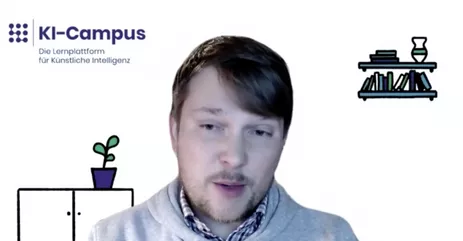
Thank you for sharing your knowledge about digital sustainability at universities with us on Monday!
Data literacy and soft skills - these are the key competences students should be looking forward to acquiring in the future and the present, according to Florian Rampelt from the Hoschschulforum Digitalisierung and the Stifterverband. But "online only" cannot be the formula; instead blended learning and participatory approaches are essential. "Different learners have different needs and different needs need different formats."
Yesterday evening our lecture series "Digital Sustainability Transformation by, of and for TUM" started with our first guest speakers. The recorded lecture can soon be found on Youtube.
"We know what we want to do. We just have to get our hands on!" as Miranda Schreurs, Professor for Environmental and Climate Policy and leader of the TUM Task Force Sustainability has put it. Now we are starters, working on networking and sharing experience, Lara Lütke-Spatz from the Bavarian Network for Sustainability in Higher Education outlines the future paths. Veronica Becker presented the new student initiative at the TUM: Plant a Seed.
Digitainability - that's how you could sum up the content and goal of the new elective event for Master's students of all disciplines at TUM in one word. If you want to know more about the project, here's the blog post (in German).
